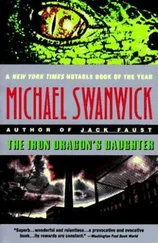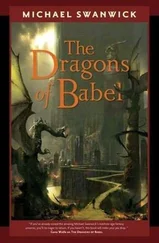Michael Swanwick - Dancing with Bears
Здесь есть возможность читать онлайн «Michael Swanwick - Dancing with Bears» весь текст электронной книги совершенно бесплатно (целиком полную версию без сокращений). В некоторых случаях можно слушать аудио, скачать через торрент в формате fb2 и присутствует краткое содержание. Жанр: Фантастика и фэнтези, на английском языке. Описание произведения, (предисловие) а так же отзывы посетителей доступны на портале библиотеки ЛибКат.
- Название:Dancing with Bears
- Автор:
- Жанр:
- Год:неизвестен
- ISBN:нет данных
- Рейтинг книги:5 / 5. Голосов: 1
-
Избранное:Добавить в избранное
- Отзывы:
-
Ваша оценка:
- 100
- 1
- 2
- 3
- 4
- 5
Dancing with Bears: краткое содержание, описание и аннотация
Предлагаем к чтению аннотацию, описание, краткое содержание или предисловие (зависит от того, что написал сам автор книги «Dancing with Bears»). Если вы не нашли необходимую информацию о книге — напишите в комментариях, мы постараемся отыскать её.
Dancing with Bears — читать онлайн бесплатно полную книгу (весь текст) целиком
Ниже представлен текст книги, разбитый по страницам. Система сохранения места последней прочитанной страницы, позволяет с удобством читать онлайн бесплатно книгу «Dancing with Bears», без необходимости каждый раз заново искать на чём Вы остановились. Поставьте закладку, и сможете в любой момент перейти на страницу, на которой закончили чтение.
Интервал:
Закладка:
Some time later two of the Pale Folk emerged from a side passage and fell in step with the stranniks. Over their shoulders they carried a metal pole. From it hung a woman, tied head and foot, like game being brought back from the hunt. She struggled furiously and finally managed to dislodge her gag.
“Holy pilgrims! Thank God!” she gasped. “You must free me from these monsters.”
“What wickedness did you do, my daughter, to find yourself in so dire a situation?” Koschei asked.
“I? Nothing! Those ass-fucking Diggers betrayed me. They-”
Svarozic restored and tightened the gag and then kissed the woman on the forehead. “If you have done no evil,” Koschei said, “then be comforted, for I am sure that you will die in a state of grace.”
At last the narrow ways opened up into a cavernous space, at the far end of which was an enormous doorway, three times the height of a man and made of smooth and unstained metal, such as could not be replicated today in any forge in the world. The door appeared at first to be shut. Only as they neared it could they see that it gaped slightly ajar, just wide enough for one person to pass through it at a time. The gap was guarded by another pale-skinned individual who favored them with neither word nor nod but merely stood aside to let the two Pale Folk, their captive, the three pilgrims, and the guide pass within.
Thus did the strannik Koschei complete his long journey from Baikonur.
Darger was driving Pepsicolova mad with his little book. He referred to it often, though not as one would a reference work, nor again as (quite) a map, nor yet as one would an inspirational tome such as Sun Tzu’s The Art of War or Machiavelli’s The Prince. He treated it almost as if it were Generation P or the I Ching or some other traditional book of divination. Yet, despite his humoring her small superstitions, Darger was clearly a rationalist. Pepsicolova could not imagine him believing in such mystic claptrap.
“If you would only be a little more open about the methodology of your search,” she said, “perhaps I could be of more help.”
“Oh, no need. We’re doing quite splendidly as it is.” Darger removed the book from his inner pocket, flipped quickly to a place in its center, and snapped it shut again. “In fact, I dare say we’re ahead of schedule.”
“What schedule are you talking about? And what’s in that book you’re always looking at?”
“Book? Oh, you mean this thing? Nothing of any importance. Sermons and homilies and the like.” He put a hand flat on a section of brick wall. “Does this seem particularly weak to you?”
“No, it does not.”
“The bricks are soft and crumbly, though. It certainly wouldn’t hurt to give them a try.”
“As you command.” So common had Darger’s demands for demolition become that Pepsicolova had taken to carrying a pry-bar with her, almost like a walking stick. She hoisted it level with the wall and thrust forward hard.
The bar punched straight through the brick. When she drew it back, there was a hole through to a space on the other side. “Enlarge it! Quickly!” Darger urged her. Then, when the hole was big enough, he began tugging and pulling at the bricks himself, yanking them free, until the opening was sufficient for them to clamber through and into the room beyond. Lanterns first, they entered.
“Look there-books, by God!”
Darger darted forward, excitedly holding up his lantern so he could examine the shelves with their warped and faded contents. Pepsicolova, however, hung back. With horror, she regarded an overstuffed chair, its upholstery half-rotted, and the small, grit-covered reading table at its side. They were not… and she knew they were not… Yet still, they paralyzed her.
Forcing an equanimity she did not feel into her voice, Pepsicolova said, “We’ve broken through into somebody’s basement. One that hasn’t been used for quite some time.” She gestured with her lantern. “See there. The doorway’s been bricked over.”
She did not add, Thank heavens.
“A basement room? Just a basement room?” Darger looked around him bewilderedly. Then he collapsed into the chair. He bowed his head into his hands and was very still.
Pepsicolova waited for him to say something, but he did not. Finally, impatiently, she said, “What is wrong with you?”
Darger sighed. “Pay me no mind. ’Tis but my black dog.”
“Black dog? What on earth are you talking about?
“I am of a melancholic turn of mind, and even a small setback such as this one can strike me with a peculiar force. Do not put yourself out about me, dear heart. I shall simply sit here in the dark, pondering, until I feel better.”
Wondering mightily, Pepsicolova stepped back from the hole in the wall. Darger was a darkness at the center of his lantern’s pool of light, a slumped caricature of despondency. It was clear that he would not move for some time yet to come.
So, with reluctance, Pepsicolova squatted down on her heels just outside the breached room, smoking and remembering. Spycraft and its attendant dangers were her solace, for their perils drove away introspection. Alas, inaction always returned, and with it her thoughts, and among them the memories. Central to which was a basement room with an overstuffed chair and a small reading table.
Afterward, Chortenko was always so serene.
His people had stripped Anya Pepsicolova bare, shaved off all her hair, save only her eyelashes, and then flung her, hands tied behind her back, into a cage in the basement of Chortenko’s mansion. The cage was one of three which Chortenko called his kennels, and it was too low for her to stand up and too short for her to stretch out at full length. There was a bucket that served her as a toilet. Once a day, a dish of water and another of food were slid into the cage. Because her hands were bound, she had to drink and eat like an animal.
If Chortenko’s purpose was to make her feel miserable and helpless, then he succeeded triumphantly. But the conditions were not what made the month she spent in his kennels a living hell.
It was the things she saw him do in that basement room.
Sometimes it was a political prisoner whom he questioned far beyond the point where the man had given up everything he knew and more, forcing the wretched captive into ever greater and more grotesque fantasies of conspiracy and treason, until finally, mercifully, he died. Sometimes it was a prostitute whom Chortenko did not question at all, but who did not leave the room alive, either.
Anya Pepsicolova saw it all.
When the deeds were done and the bodies cleared away, underlings would bring in an overstuffed green leather chair, and light a reading lamp beside it. Then Chortenko would sit puffing on his pipe and unhurriedly reading War and Peace or something by Dostoyevsky, a glass of brandy on a little stand by his elbow.
One day, a man was thrown into the kennel next to her. They hadn’t bothered to strip and shave him, which meant that he was one of the lucky ones who would be dealt with in a single night. When the guards were gone, he said, “How long have you been here?”
Pepsicolova was huddled in the center of her cage, chin on her knees. “Long enough.” She didn’t make friends with the meat anymore.
“What was your crime?” “It doesn’t matter.” “I wrote a treatise on economics.”
She said nothing.
“It dealt with the limits of political expansion. I proved that under our economic system, and given the speed with which information travels, the Russian Empire cannot be resurrected. I thought that the Duke of Muscovy would find it a useful addition to current political thought. Needless to say, his people did not agree.” He made a little laugh that turned into something very much like a sob. Then, suddenly breaking, as the weaker ones would, he pleaded with her: “Please don’t be like that. Please. We are both prisoners together-if you can’t do anything else, at least help me keep my spirits up.”
Читать дальшеИнтервал:
Закладка:
Похожие книги на «Dancing with Bears»
Представляем Вашему вниманию похожие книги на «Dancing with Bears» списком для выбора. Мы отобрали схожую по названию и смыслу литературу в надежде предоставить читателям больше вариантов отыскать новые, интересные, ещё непрочитанные произведения.
Обсуждение, отзывы о книге «Dancing with Bears» и просто собственные мнения читателей. Оставьте ваши комментарии, напишите, что Вы думаете о произведении, его смысле или главных героях. Укажите что конкретно понравилось, а что нет, и почему Вы так считаете.






